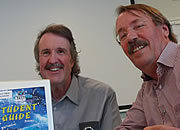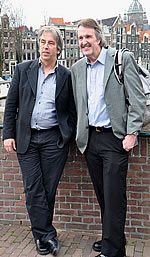door Dennis Harper
 Onlangs was Dennis Harper, initiatiefnemer van Generation Yes (ook wel GenYes genoemd) in Nederland. Na een ontmoeting met Dennis tijdens NECC2010 vorig jaar in Washington besloot de ICT-coördinator van het grootste schoolbestuur op Curacao (RKCS) Dennis naar Curacao te halen planner. Dit jaar nam SLBdiensten (Slim) het initiatief hem naar Nederland uit te nodigen. Dennis gaf een presentatie aan mensen die zich met ICT en onderwijs zaken bezighouden (zie het verslag en fotoreportage op de website Informaticavo.nl van Frans Peeters Skip bo for pc free. Voor ICTnieuws.nl schreef Dennis exclusief het volgende platformartikel.
Onlangs was Dennis Harper, initiatiefnemer van Generation Yes (ook wel GenYes genoemd) in Nederland. Na een ontmoeting met Dennis tijdens NECC2010 vorig jaar in Washington besloot de ICT-coördinator van het grootste schoolbestuur op Curacao (RKCS) Dennis naar Curacao te halen planner. Dit jaar nam SLBdiensten (Slim) het initiatief hem naar Nederland uit te nodigen. Dennis gaf een presentatie aan mensen die zich met ICT en onderwijs zaken bezighouden (zie het verslag en fotoreportage op de website Informaticavo.nl van Frans Peeters Skip bo for pc free. Voor ICTnieuws.nl schreef Dennis exclusief het volgende platformartikel.
Zie eerst dit korte exclusieve interview met Dennis Harper.
The Change Agents
It is wonderful to be back in the Netherlands visiting schools and speaking to educators and students magenta sport download. For more than 30 years I have kept up with develop-ments in educational technology from my Dutch friends and listening to several conference presentations.
It seems to me that schools in the Netherlands are struggling with the same three major tasks that the rest of the world when it comes to education technology swr1 leute podcast herunterladen.
 Much has been written about models and programs that have addressed these 3 tasks but for the most part schools have not changed all that much given the advancement of technology in the 21st century word 2010 kostenlos downloaden chip. I would argue that the reason technology has not greatly affected schools is that too much responsibility for doing so has been given to adults.
Much has been written about models and programs that have addressed these 3 tasks but for the most part schools have not changed all that much given the advancement of technology in the 21st century word 2010 kostenlos downloaden chip. I would argue that the reason technology has not greatly affected schools is that too much responsibility for doing so has been given to adults.
Students make up about 92% of a typical school with the adults being the other seven. One could make a case that the average student has more technology skills than the average teacher. It would follow that students have at least 92% of the technology expertise in a school herunterladen. A recent large study in the United States, it was found that for every hour a student is in school, they spend two hours in looking at a screen. Couldn’t some of that time be spent on the above three tasks?
 Indeed, there are more than 1,000 American schools that have established a Student Technology Leaders program where a group of 10 to 20 students in a primary or secondary school are prepared to provide major technology support youtube playlist download mp3 kostenlos. The student technology leaders (STLs) assist teachers in two major ways. They help teachers learn about Internet and computer-based applications and they help teachers produce resources to use in their classroom.
Indeed, there are more than 1,000 American schools that have established a Student Technology Leaders program where a group of 10 to 20 students in a primary or secondary school are prepared to provide major technology support youtube playlist download mp3 kostenlos. The student technology leaders (STLs) assist teachers in two major ways. They help teachers learn about Internet and computer-based applications and they help teachers produce resources to use in their classroom.
These teams of STLs also help their peers show they are technology literate. Typically, students are showing they are technology literate by completing two substantial technology-infused projects yahoo messenger german download for free. It is the STLs that mentor their peers to help them create these projects and also assess the projects to see they have met national technology standards. These projects typically are related to subjects they are studying and range from digital videos, to websites, to collaborations with experts and students throughout the world app ohne app store downloaden.
Finally, in many cases, these same students can assist the ICT staff maintain the school’s technology infrastructure. This might include cleaning computers, upgrading memory and software, and troubleshooting computer and network problems.
There are many advantages of having these Student Technology Leaders video downloaden für android. They provide onsite and nearly immediate assistance, students have leadership opportunities, and the model is very cost effective.
Of course, I hear the same arguments in the Netherlands that I hear in other nations when it comes to implementing such a model. These include:
 The teachers will never want to learn from or collaborate with these student technology leaders. In fact this is has not been the case. Most teachers actually like working with students at this level. In fact, more than 98% of 100,000 teachers that have worked with STLs over the past 14 years have said they prefer learning technology skills from students as opposed to adults.
The teachers will never want to learn from or collaborate with these student technology leaders. In fact this is has not been the case. Most teachers actually like working with students at this level. In fact, more than 98% of 100,000 teachers that have worked with STLs over the past 14 years have said they prefer learning technology skills from students as opposed to adults.Schools can trust students to be more than the object of change. Students can be the primary change agents. More than 100 research studies have shown the value of this approach.
Dennis Harper